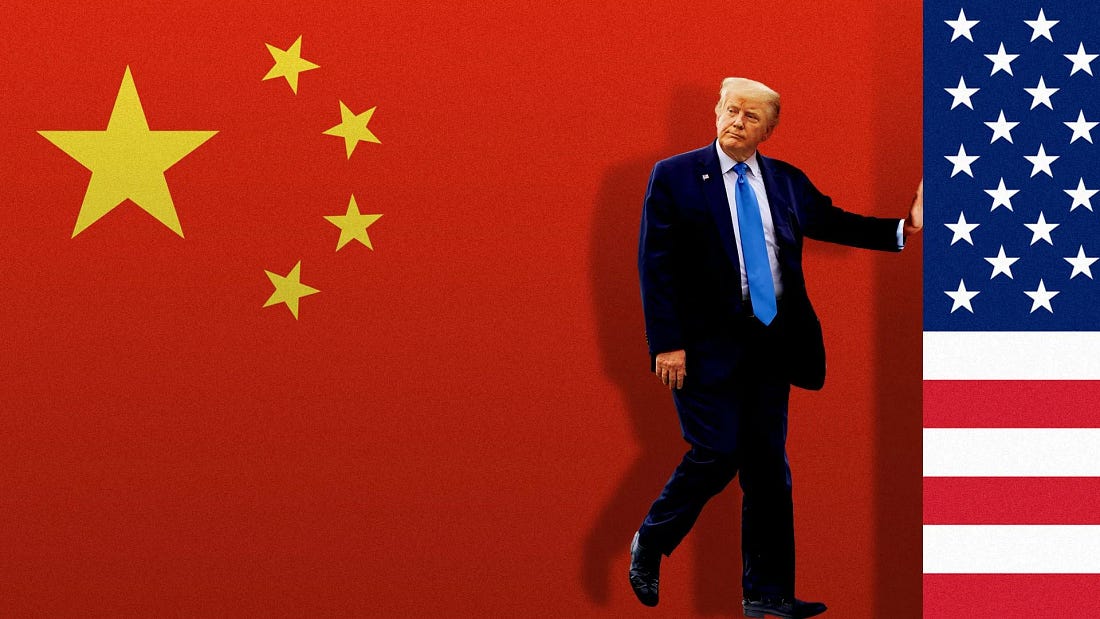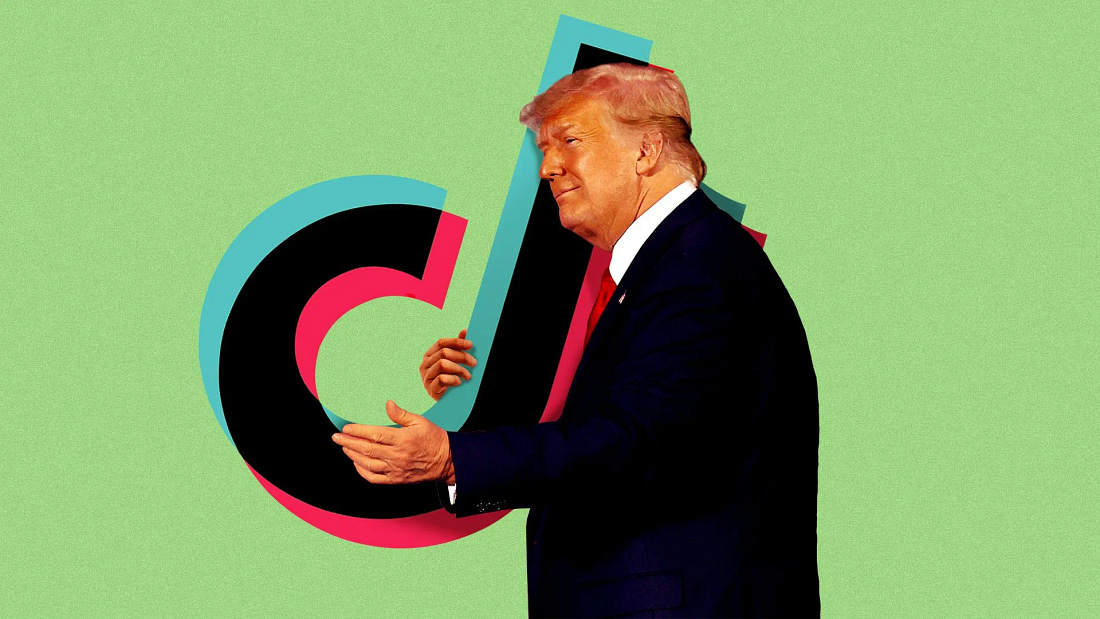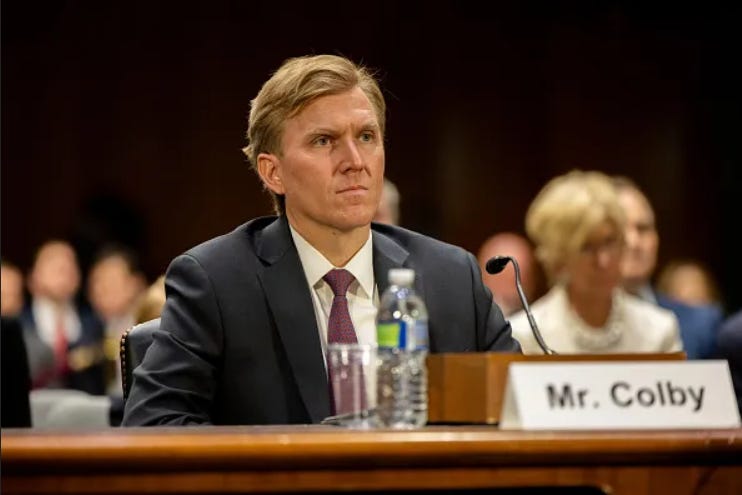The Beijing Bait and SwitchIs the Trump administration living up to its tough-on-China campaign rhetoric, or is it folding to Beijing?Over the course of the 2024 presidential campaign, the issue of China was a recurring foreign policy debate. Then-candidate Trump harshly criticized the Biden administration’s approach to the adversarial nation, calling him “pro-China” and attacking the incumbent’s policies on everything from defense to tariffs. He claimed that his administration would be strong on China, taking an “aggressive” posture on countering Beijing. He surrounded himself with supposed China hawks and many foreign policy advisors from the so-called restrainer or prioritizer faction within the political right. These individuals, primarily represented by Vice President JD Vance, promulgate a strategic outlook dedicated solely to challenging China, at the expense of other theaters like Europe and the Middle East. They see themselves as managing our limitations so as to put us in the best position to triumph over the Chinese Communist threat. Even after the victory last November, the Trump team kept up the rhetorical pressure on Beijing. It was a centerpiece of confirmation hearings for foreign policy and economic officials, as well as a key argument marshaled by the president’s online influencer brigade. Since the inauguration in January, Trump and his handpicked subordinates have had over six months to turn their striking rhetoric into reality and bring America forward into a place of strength in the contest with the CCP. Have they succeeded? Absolutely not. On the contrary, the second Trump administration’s China policy has been characterized by deference to Beijing, unilateral concessions in search of an all-encompassing trade deal, and an unwillingness to punish China for its malign deeds. It resembles Nixon’s détente far more than it does Reagan’s more combative approach. And it flies in the face of the promises he made on the trail in 2024. Instead of standing up to Beijing, Trump has routinely backed down, harming American interests along the way. The goal of this deferential policy is to sign a new, all-encompassing commercial deal with Beijing, ending what the president believes is the scourge of trade deficits with one of our largest economic partners. If the push for a deal is successful, the end result would not be a reversal of our reliance on China for vital imports, from rare earth minerals and pharmaceuticals to consumer goods and electronics, but a cementing of that reliance in writing. Instead of decoupling from our greatest geopolitical adversary, denying them the riches of our market and eliminating a major cudgel they could use against us to forward their strategic aims, we would be doubling down on the relationship and binding ourselves closer to Beijing. The president says that he is using unilateral tariffs – constitutionally suspect, yet thus far still in place – to try and compel China into making a pro-America trade deal. Not only is this deal a bad thing, and it surely is, but the means of achieving it are both inconsistent and counterproductive. Tariffs are taxes on American importers, whether they are businesses or consumers. These are, contra the president, not borne by foreign nations. Still, even if tariffs were effective as taxes on foreigners or negotiating tools, the haphazard and confusing manner in which these particular tariffs were imposed negated that effectiveness. In the specific case of China, the president has been extremely mercurial, talking about 150 percent tariffs one day and saying he’s reducing them to relatively small levels the next. His early executive order levying higher tariffs on Beijing has been suspended multiple times by the administration, granting China a reprieve and allowing them to face a lower tariff rate than even some friendly nations. Depending on which calculation one uses, China may currently face a lower tariff rate than Taiwan – expressly undermining the ostensible purpose of the whole endeavor. The deal itself is the point, not winning the broader geostrategic competition. This is evident through the administration’s own messaging, which focuses on “constructive” discussions with Beijing and on rectifying the trade deficit, instead of on the serious danger the CCP poses to America’s global interests. Every one of this administration’s soft-on-China actions has been in pursuit of this terrible deal. But Xi Jinping just keeps on pulling away and getting greater concessions from Trump every time, all of which hurt our mission of denying China regional hegemony. The soft-on-China tariff policy does not only relate to tariffs levied against Beijing, but those imposed on other Asian nations, including close friends and treaty allies. As mentioned earlier, the tariff rates placed on several other nations exceed those forced on China. This is bad economic policy and even worse geopolitics. These taxes have shocked and enraged allies like Japan, South Korea, and the Philippines, making the creation of a durable security architecture in the region much harder. Unlike NATO in Europe, we will be unable to tie these nations to one another directly – the longstanding mutual distrust and dislike precludes that – so we must tie them to one another via ourselves as the coalition balancer. Alienating these friends guarantees failure in that quest. More and more, it is looking like this is not just an acceptable outcome for Washington, but a preferred one. One particularly symbolic example of the administration’s pro-China bent came in late July, when they essentially told the president of Taiwan, Lai Ching-te, not to come to the United States to meet with supporters of the island nation. This was done purely as a sop to Beijing in the hopes of avoiding issues in trade talks and not derailing a potential Trump-Xi summit later this year. Hosting the Taiwanese leader, even if in an entirely unofficial capacity, was a bridge too far for the Trump team. This stands in marked contrast to the first term, in which one of the president’s earliest phone calls was with Taiwan’s then-leader Tsai Ing-Wen. Allowing Taiwan’s leader to visit America would show that we support the beleaguered nation in the face of immense Chinese aggression. Instead, we kowtowed to Beijing’s wishes and made it clear which side of this conflict is more important to the present government. This move was more emblematic than it was a concrete policy decision, but there are plenty of those to choose from. One just happens to be the most blatantly illegal thing that the president has done thus far: the refusal to enforce the law banning TikTok. TikTok is, without a doubt, a social network in name only; in reality, it is a CCP-controlled spyware and propaganda app targeting American youth with malign anti-American messaging. The app has become the most popular source of news among these age groups and it routinely pushes content that paints the US in a bad light. After years of mooting the possibility of a ban – first by Donald Trump back in 2020 – it was finally signed into law in 2024, passing with overwhelming bipartisan support. TikTok litigated the ban, going all the way to the Supreme Court, where it was upheld by a unanimous 9-0 decision. The law should have been in force just as President Trump was inaugurated, but he has unilaterally granted the app an ongoing reprieve. There is nothing at all in the text of the law that allows this, but the administration has deemed it enough of a priority to violate the president’s oath of office over. Indeed, President Trump now has an account on the app, reinforcing its status as a permanent part of the American internet ecosystem and allowing the Chinese a direct megaphone into the minds of tens of millions of impressionable young Americans. Enforcing this ban is the lowest of low-hanging fruit to be tough on China, yet the administration chose not to pick it. In retrospect, this was a clear signal that the campaign’s tough-on-China messaging was a farce. Another move that has put the lie to the campaign’s anti-China rhetoric is how the administration is dealing with advanced microchip sales to Chinese companies. Export controls on sensitive technologies like chips have been in place for years now, put into effect by both the Trump and Biden administrations. These chips have civilian uses – especially for artificial intelligence development – but are considered dual-use technologies due to their significant military applications. China’s business environment is not independent of the CCP; in fact, every Chinese company of note has embedded party cadres, is subordinated to the will of the government, and works hand-in-glove with the state. Many of the purchasers of these high-tech chips are themselves state-owned enterprises who could easily funnel them to military consumers. Now, instead of banning sales of these foundational modern technologies to our greatest enemy, the Trump team is incentivizing them. It has allowed the sale of these chips to Chinese buyers on the lone condition that the federal government gets a 15 percent cut of the revenue. This is not only terrible strategic and economic policy; it very well may be an unconstitutional export tax. Restricting sales of these chips was actually hurting China by forcing them to use substandard technologies in their pursuit of AI and military advancements. Trump has chosen to drop this successful policy to assuage Beijing and to claim a domestic policy win, even though a novel tax on exports is nothing of the sort. It will absolutely come back to bite us in the end, when China advances on the back of American tech it should never have had access to. One of the biggest fights that the second Trump administration has picked thus far is with elite universities. He has harped on DEI initiatives, antisemitism on campus, and institutional support for left-wing causes. Many of the administration’s enforcement actions have been in relation to international student visas, which are being curtailed as both a punitive measure and an immigration/national security concern. Some of this is very good – the university system needs a fundamental revamp to meet the needs of the future, better prepare Americans for productive lives, and reduce their exorbitant costs and pervasive bias – but the student visa issue has been fraught. Reducing the overall number of student visas from friendly nations with whom we desire stronger ties is a bad idea. But surely everyone can agree that if student visas are being cut, the first ones to go are those from our most preeminent foe, right? Not Donald J. Trump. He has floated the idea of allowing 600,000 Chinese students to come to the United States, for both graduate and undergraduate study, as a concession to bring Beijing to the table for a deal. This is absurd on its face. Chinese students are often related to CCP members, including the top of the Party’s hierarchy. Even when they are not, many in graduate study are funded by the Chinese military and all are subject to Beijing’s increasingly draconian national security laws, compelling Chinese citizens anywhere on Earth to act at the regime’s behest. Currently, there are 270,000 Chinese nationals studying in America. This is already far too many. Members of the Cabinet, notably Secretary of State/National Security Advisor Marco Rubio, have said as much. During the first Trump term, Chinese student visas were curtailed because of these very real concerns. Now, they’re being doubled for a chance at a deal we should not be interested in making. Another effectively pro-China change is even more disturbing: the revision of the National Defense Strategy to fully deprioritize great power rivalry and focus alternatively on the Western Hemisphere. According to reporting by Politico, this change sets the primary goals of the American military as protecting the homeland and tackling regional threats, like narcotics cartels and transnational crime. These are meaningful priorities, but not for a force as powerful as the US armed forces. Indeed, they are already handled by domestic law enforcement, other federal agencies, or armed units like the Coast Guard. This move, driven by Undersecretary of Defense for Policy Elbridge Colby, would mean that America would lose the geopolitical competition with China without even bothering to take the playing field. It would, in effect, be forfeiting the whole idea of American global power, returning us to the geopolitical position of the late 19th century before the US became a primary international player. Suffice it to say, this would bode extremely poorly for global security, American economic development, and the future of freedom across the planet. The shift away from centering great power rivalry is a major reversal from US policy since at least the first Trump term, if not the second Obama administration. We have not always followed through on these attempts to pivot to great power geopolitics, but we have certainly made a point of explaining how important it was for the future of American strategy. That may no longer be the case. There is simply no excuse for this; it cedes the entire Asian continent and littoral to an enemy power, creates a destabilizing situation in the Middle East, and gives short shrift to our NATO treaty obligations. It would be an utter calamity for American foreign policy. At the same time, it is a generous gift to our enemies, who will certainly not be deterred by a weak, inward-looking, decline-embracing United States. And they surely will not leave us alone here in our own backyard. In fact, they will likely be emboldened by our withdrawal, just as Russia was emboldened by our withdrawal from Afghanistan. If put into place, this policy would be ten times worse than that absolute debacle. In all, it puts the lie to the very idea that the restrainer/prioritizer set is anything but neo-isolationist at its core. There’s yet more soft-on-China defense policy emanating from the mind of Colby over at the Pentagon, including a full review of the AUKUS nuclear submarine pact between the US, Australia, and the UK. This program, brought into being by the Biden administration in one of their few good ideas, would cement the tripartite alliance between the Anglosphere powers and create a project meant to directly confront Chinese aggression. There are problems with the pace of delivery for some of the contracted submarines, but this does not merit throwing the baby out with the bathwater. The AUKUS pact is a great way to tie us further into the Pacific security architecture and orient it properly around deterring Chinese regional hegemony. At one point, this was the entire purpose of Colby’s career; the book that made him famous, The Strategy of Denial, is based around this very idea. Now, he has done a complete 180, and AUKUS may be a casualty of that terrible turn. Ending the program would alienate a key ally, remove a potential stumbling block for Chinese expansion in the region, and make America look indecisive and unreliable to our friends – the death knell for credible deterrence. Altogether, these and other actions taken in just the first six months of the second Trump administration betray the tough-on-China rhetoric of the campaign as mere bluster. There is no challenging of China. There is only appeasement. This is surely not what we were promised. And it is not what we got during the first four years of Trump, either. Despite problems in execution and rhetoric, the first term brought the US into a much more realistic posture towards Beijing, refusing to avoid the obvious reality of our mutual enmity. This, along with the hardline promises made during the campaign last year, is the correct policy. Fiercely opposing China is a must if America is to win the 21st century. Trump himself knew this, as did many of his key advisors. Yet now that they are in power, their position has reversed itself. It does not necessarily matter why the administration made this change; it could be pecuniary in nature, desire to avoid a serious challenge, or simply rank cowardice. The thing that matters is that the change did indeed occur. The pattern of soft-on-China policies that harm American interests is crystal clear and has immense evidentiary backing. The next few years will be crucial when it comes to our rivalry with Beijing and our attempts to deny the evil Chinese Communist Party unchallenged dominion over Asia, the world’s most important geostrategic region. Instead of steeling ourselves for the challenge of our lives, the Trump administration is seeking to dodge it wholesale by selling out to our strongest adversary. Even if a deal was reached through all of these absurd concessions, it would be immensely harmful to American interests. It would allow China to cripple us economically in case of martial conflict, but we may not even have to worry about that possibility if Colby and his neo-isolationist ilk at the Pentagon have their way. We cannot afford to squander these critical years pursuing a terrible strategy that empowers our chief opponent and denigrates our indispensable allies. In this particular case, we need campaign Trump, not governing Trump. We need tough-on-China action, not soft-on-China policy. We need confrontation, not conciliation. The test is here. We have no time to waste. Anything less will result in absolute disaster for our nation’s future. Rational Policy is free today. But if you enjoyed this post, you can tell Rational Policy that their writing is valuable by pledging a future subscription. You won't be charged unless they enable payments. |
Wednesday, 10 September 2025
The Beijing Bait and Switch
Subscribe to:
Post Comments (Atom)
The Beijing Bait and Switch
Is the Trump administration living up to its tough-on-China campaign rhetoric, or is it folding to Beijing? ͏ ͏ ͏ ͏ ͏ ...
-
On March 26, 2024, Associate Policy Director Brianna January submitted written t...



No comments:
Post a Comment